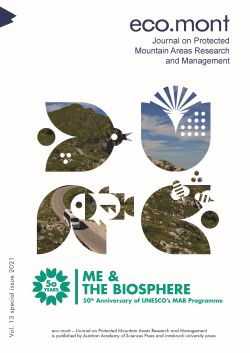Valerie Braun – Martin Coy – Günter Köck (Eds.) - Arne Arnberger (Co-Editor)
eco.mont vol.13 - special issue 2021
ME AND THE BIOSPHERE
50th Anniversary of UNESCO’s MAB Programme
Journal on Protected Mountain Areas Research and Management
Pablo Mansilla-Quiñones,
Susana Cortés-Morales,
Andrés Moreira-Muñoz
S. 108 - 114
doi:
10.1553/eco.mont-13-sis108
Verlag der Österreichischen Akademie der Wissenschaften
doi:
10.1553/eco.mont-13-sis108
Abstract:
Landscape-scale conservation at the regional level is an important challenge for Biosphere Reserves (BRs), especially those located in areas suffering from depopulation and rural shrinkage. This is the case of the BRs of the southernmost part of Chile, in the Magallanes region. An analysis of the implications of deterritorialization (the radical reduction or disappearance of inhabitants, their traditional ecological practices, and their material and affective links with the territory) is lacking in the literature, particularly in relation to the migration of young people towards other human settlements. This is a critical situation for BRs because there is a tight link between depopulation and the sustainability of socio-ecological systems. Here we discuss, on the one hand, the limitations and negative impacts of repopulation attempts by extractive industries and, on the other, the possibilities of involving rural youth in initiatives that encourage the re-territorialization of ecological practices and knowledge that have been developed by generations of local inhabitants, as a way of promoting bioculturally sustainable modes of re-inhabiting these territories.
landscape-scale conservation, re-territorialization, Patagonia, volunteering, MAB Programme, rural depopulation, biosphere reserves
Published Online:
2021/11/23 12:56:34
Object Identifier:
0xc1aa5576 0x003d0419
Rights:https://creativecommons.org/licenses/by-nc-nd/4.0/
The journal "eco.mont"; – Journal of protected mountain areas research and management – was published for the first time in June 2009.
The journal was founded as a joint initiative of the Alpine Network of Protected Areas (ALPARC), the International Scientific Committee on Research in the Alps (ISCAR), the Austrian Academy of Sciences (ÖAW) and the University of Innsbruck.
The journal aims to highlight research on and management issues in protected areas in the Alps without excluding other protected mountain areas in Europe or overseas. Its target audiences are scientists from all related disciplines, managers of protected areas and interested individuals including practitioners, visitors, teachers, etc.
The journal presents peer-reviewed articles in English by authors who research protected mountain areas and management issues within these areas. It's published twice a year as a collaboration of the Austrian Academy of Sciences Press – responsible for the e-version – and Innsbruck University Press – responsible for the print version.
Die Zeitschrift „eco.mont“ – Zeitschrift zur Forschung in Gebirgsschutzgebieten – erschien im Juni 2009 zum ersten Mal. Die Zeitschrift wurde auf Initiative des Netzwerks Alpiner Schutzgebiete (ALPARC), der Schweizer Akademie der Naturwissenschaften (ISCAR), der Österreichischen Akademie der Wissenschaften (ÖAW) und der Universität Innsbruck gegründet. Sie hat das Ziel, Themen zu behandeln, die gleichzeitig Forschung und Verwaltung in und über die Schutzgebiete der Alpen betreffen, ohne dabei andere Gebirgsschutzgebiete Europas oder anderswo auszuschließen. Diese neue Zeitschrift richtet sich an ein Publikum von Wissenschaftlern der verschiedensten Fachbereiche, an die Verwalter von Schutzgebieten und an alle sonstigen Interessierten, Praktiker, Besucher, Lehrpersonal etc. einbegriffen. Die Zeitschrift veröffentlicht begutachtete Beiträge auf Englisch von Autoren, die Fragen der Gebirgsschutzgebiete und deren Verwaltung betreffen. Sie erscheint zweimal pro Jahr, auf der Basis der gemeinsamen Anstrengungen des Verlags der Österreichischen Akademie der Wissenschaften, der für die digitale Fassung verantwortlich ist, und der Presse der Universität Innsbruck, verantwortlich für die gedruckte Fassung.



 Home
Home Print
Print
 References
References
 Share
Share

